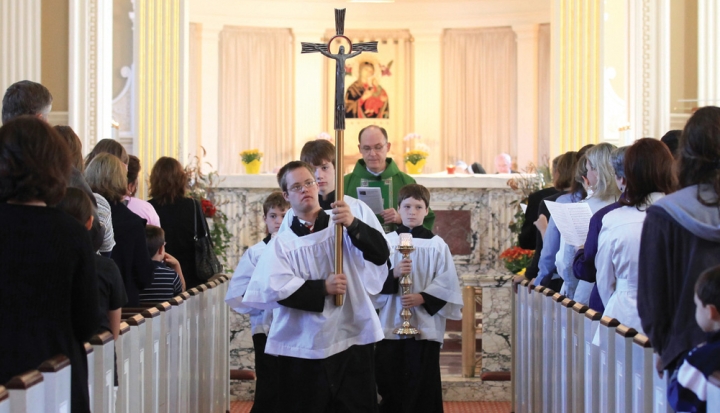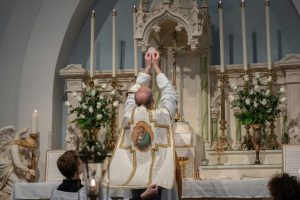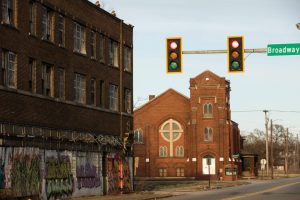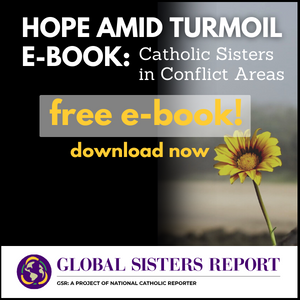Like many other lifelong Catholics, Danny Benavidez, a member of St. Rose of Lima Parish in Chula Vista, California, helps out at his parish in a number of ways. On Thursdays he serves as a eucharistic minister. Every other Sunday he delivers communion to the homebound. Once a month he listens to the “talking, talking, talking” at his Knights of Columbus meeting. And once a week—usually Tuesday—he stops into a neighboring parish to visit an old friend, who is now a deacon.
Benavidez, who has Down syndrome, is a third-degree Knight. He was an altar server for 20 years. Since 1981 he has been involved in his parish’s Faith and Light community for people with developmental disabilities and their family members and friends. Passionate about his faith, he joyfully greets his pastor at Mass every week.
“Everybody knows him,” says Edith Benavidez, Danny’s mother. “He’s the type who will go up and talk to anybody.”
Benavidez is one of a reported 2.5 million people with a developmental disability in the United States today, as estimated by the Centers for Disease Control (CDC). At 59, he has difficulties with communication and cannot live independently. He lives with his parents, works part-time as a McDonald’s custodian, bowls in three separate leagues, and loves to spend time with his Catholic community.
“It makes me feel better,” he says. “I like doing things at church.”
According to the CDC, the number of children born with developmental disabilities has increased 17.1 percent since 1997. Included in those numbers is a rapid increase in the number of children diagnosed with autism, which has jumped 289.5 percent.
As more knowledge comes to light about these disabilities and their symptoms, parishes around the United States are learning how best to accommodate Catholics like Danny. For some parishes, this means specially adapted Masses or religious education classes. For others, it’s working with parishioners to change attitudes to create a more welcoming atmosphere.
For all, it’s part of an ongoing journey toward a more universal church—one that is accepting of not only other ethnicities and cultures, but other abilities as well.
An ongoing mission
Though it is a perpetual challenge, outreach to people with disabilities is nothing new for the Catholic Church. The U.S. Conference of Catholic Bishops first established an advisory committee on disabilities in 1975, with the goal of founding a national office. Three years later, in November 1978, the bishops released the Pastoral Statement on Persons with Disabilities, which discussed the church’s responsibility to advocate for the rights of people with disabilities in society while welcoming them into the heart of the faith.
“As pastors of the church in America, we are committed to working for a deeper understanding of both the pain and the potential of our neighbors who are blind, deaf, mentally retarded [sic], emotionally impaired, who have special learning problems, or who suffer from single or multiple physical handicaps—all those whom disability may set apart,” the document reads. “We call upon people of good will to reexamine their attitudes toward their brothers and sisters with disabilities and promote their well-being, acting with the sense of justice and the compassion that the Lord so clearly desires.”
Included in the letter was a call to action that encouraged dioceses to form offices focused entirely on accommodating and encouraging those with disabilities. In 1982, the National Catholic Partnership on Disability (NCPD) was established to be a resource for those offices and the church.
Today, the NCPD provides advocacy for people with disabilities as well as ongoing support and guidance for diocesan disability directors and other parish and catechetical leaders. The NCPD also works to develop disability ministry resources such as distance-learning web seminars and large-print lectionaries and Roman missals for priests with visual impairments.
Jan Benton has been involved with the NCPD since its formation and has served as executive director since 2004. She believes the organization’s work is mutually beneficial for both parishes and for those with disabilities.
“They’re part of the body of Christ, they’re part of the community, they’re part of our family, and if they’re not there, we’re missing a big element,” she says. “I think we’re the church at its best when we are being responsive to each other and to each other’s needs.”
As part of her job, Benton forms relationships with the diocesan employees in charge of ministering to the disabled. Sometimes those people are in offices specially designated for inclusion ministry, but often helping people with disabilities is just one job on a list of many. Because of budget cuts in dioceses around the country, Benton has seen many disability-focused offices shut down. As a result, her office is beginning to work more closely with parishes, providing catechetical resources, educational materials, and recommendations for diocesan resources.
In response to the ever-growing rate of autism in the United States—where a 2013 CDC study showed an estimated 1 in 50 children between the ages of 6 and 17 is now on the autism spectrum—the NCPD established an Autism Task Force in 2010. The task force’s mission is to look at the state of disability ministry in the church with regards to autism, see what resources, programs, and curricula are available, and do whatever is possible to improve or expand on those findings.
In 2013 the Autism Task Force has been researching and working with parishes, schools, organizations, and publishing companies on how to better accommodate people with autism. In November they unveiled a new app to prepare students with autism and intellectual disabilities for Mass and the sacraments, as well as an interactive website with resources, multimedia training materials, and community message boards.
A church for everyone
Dorothy Coughlin knows exactly what it looks like when people with disabilities are left out of the church. She grew up in a large Catholic family with a younger sister who was born with a profound developmental disability.
“We had eight kids in our family and all of us would go to church—seven of us could go, but not my sister. When we went to Catholic school, we all could go except my sister,” she says. “The church didn’t hear disability, it didn’t see disability. That reality was pretty much missing in my experience of the church.”
Because of those memories, Coughlin can remember exactly how she felt after reading the bishops’ pastoral letter on disabilities more than 30 years ago.
“As a child, my expectation was that the church was where people would feel most welcome and most accepted, so when I read the bishops’ pastoral, it was a statement of the church I had hoped for,” she says. “I wanted it to come alive; I didn’t want that document to be filed away. Whatever needed to be done, I wanted to be a part of that.”
For 33 years Coughlin has been the director of the Office of People with Disabilities in the Archdiocese of Portland, Oregon and a board member for the NCPD. As part of her job, she works with pastors, church leaders, and families to figure out the best ways to minister to people with disabilities.
Through her years in the ministry, she has seen many changes. When she first started, only 8 percent of churches in Oregon were handicap accessible. Today more than 90 percent of the churches in the Portland archdiocese are in compliance with the Americans with Disabilities Act. Coughlin has also seen an increase in catechetical information available for people with disabilities. In the early days, she can remember urging publishers to write materials for people with special needs. Today many catechetical resources have accommodations for students with intellectual and developmental disabilities already included. In 2011 Loyola Press came out with a program for adaptive sacramental prep.
“That’s been a wonderful change,” Coughlin says. “Part of this history started long ago, and one of the joys for me has been being able to see the church grow and develop its capacity to be a faith community for all parishioners and all people.”
Among the many diocesan programs for people with developmental disabilities under Coughlin’s office are the Rex Faith Community at the University of Portland, which pairs college students with adults with disabilities; a Friend to Friend program that shows Catholic school students how to engage and form friendships with patients at the nearby Providence Center for Medically Fragile Children in Portland; annual English and Spanish retreats for families of children with disabilities; and a 20-year-old grant program that has helped more than 100 families purchase respite care or adaptive equipment, and deal with medical bills or unexpected expenses.
For nearly 30 years, Coughlin has also helped organize regular adapted liturgies where people with developmental disabilities are given as much space and flexibility as they need to feel comfortable. Today there are four parishes in the archdiocese that offer these liturgies, including one in Spanish. Compared to a traditional Mass, the liturgies are shorter, with language that is easier to understand and music that is simple and repetitive. Readings are often acted out, and attendees are allowed to move around or vocalize as much as they need to.
Coughlin believes they are valuable because they allow families to attend Mass together without worrying about causing a disturbance or being judged.
“All of our vulnerabilities hang out and it’s great,” Coughlin says. “It’s like, we know each other’s sorrows, each other’s joys, we know each other’s victories, and we carry each other’s incredible challenges together. It feels wonderful to be a part of the community.”
Father David Schiferl, pastor of St. Alexander Parish in Cornelius, Oregon, has offered an adapted liturgy for Hispanic families on the first Sunday of each month since 2004. He can remember one occasion when a new family came to Mass with an 8-year-old son who had autism. Anxious and uncomfortable in a new place, the son was moving around a lot until he finally found a place he felt comfortable sitting—directly under the altar.
“The mother was concerned and I said, ‘Leave him there, he’s comfortable, he’s found a home,’ ” Schiferl says. “That I think is indicative of this Mass and the community. Everybody there recognized right away that if that’s where he wants to be, that’s a good place for him. We’re here celebrating the presence of Jesus Christ in the community so we want everyone to be at home, to relax as we celebrate the love of God together.”
The gifts they share
Of course Catholics are called not to be served, but to serve, and Schiferl believes it should be no different for people with developmental disabilities.
“We don’t want people to come in and feel like, ‘I’m being ministered to, but I’m not able to minister,’ ” he says. “The reality is, each one of us does both. We all know an important part of belonging is being able to offer our gifts, so we want to provide as many opportunities as possible and be as creative as possible in giving people the opportunities to use their gifts.”
That view was echoed by Marsha Rivas, director of the Office of Equal Access Ministries in the Diocese of Toledo, Ohio. Rivas believes people with disabilities can serve parishes in almost every way a person without disabilities can. That means serving on the altar, being eucharistic ministers, bringing up the collection plate, handing out bulletins, and serving as ushers or even as lectors. The key, she believes, is to let people with disabilities know they are welcome.
Rivas remembers during a retreat earlier this year talking to Sally Adair, a 52-year-old parishioner of Christ the King Parish in Toledo who has an intellectual disability. Rivas asked if Adair, a lifelong Catholic, had ever considered volunteering as a eucharistic minister.
“And she said, ‘No, I really want to be a server,’ ” Rivas says. “She had always watched the servers and she knew what to do, but the truth is nobody had ever asked her.”
From there, Rivas helped Adair sign up for the altar server program. Because she had been paying close attention for so many years, Adair needed only one day to complete the three-day training. Now she volunteers as a server once a week.
“I wanted to be one since I was a little girl because my two brothers were altar boys, and ever since they were one, I’ve been wanting to,” Adair says. “It makes me feel good inside that I’m serving the Lord, because I know this is the one thing he would want me to do.”
Rivas now knows the best way to
get people with disabilities involved is to personally invite them. “So often parishes assume, ‘This ministry is open to all women, they will feel welcome,’ ” Rivas says. “But this population assumes that it’s not for them, unless somebody reaches out.”
Adair, for one, is thankful for the opportunity to serve. “Just because we have disabilities doesn’t mean we can’t do some of the things normal people do,” she says. “We are still human beings and God made us in his own special way. The church does recognize that, and I’m glad they do.”
The parish response
While programs and ministries can be effective in welcoming people with disabilities, much will always depend on the personal response an individual with developmental disabilities receives at their home parish. Rebecca Susag, a parishioner of St. Joseph Parish in Hastings, Minnesota, has felt her share of rejection through the years on behalf of her 32-year-old daughter, Marta, who has autism.
“We really quit going to church for a while,” Susag says. “We’ve had nasty comments over the years, but we continue to stay involved. We had great difficulty getting her to receive her first communion, because she wasn’t involved in any of the sacramental programs and there was no Catholic education for her. Marta was left by the wayside.”
Eventually Susag was able to work with her pastor so her daughter could receive the sacraments. The parish has become more accepting of Marta over time, and the family has become involved with a local Faith and Light community (see sidebar), where they receive support, friendship, and Catholic spiritual growth. Though Susag must drive 70 miles round-trip to get to the meetings, she is thankful her daughter has a strong community.
“It’s the only place she can go other than our parish where there’s somebody who cares about her and isn’t paid to be in her life,” Susag says. “People just want to be with her because she is who she is, and for me, that’s just golden.”
Struggles to find a place in the church are not uncommon for people with developmental disabilities, says Susag. “We have somebody down the road who has some serious behaviors and seizures, and he doesn’t come to church. That’s not atypical for Catholics,” she says. “My dream would be that people would ask, ‘What can we do to make it so your family can be knit into our church community? What do you need from us?’ ”
Though the NCPD has prepared resources for sacramental preparation and catechesis for people with developmental disabilities, the next challenge becomes raising awareness among parish leaders that such programs are necessary and beneficial in order to keep people with disabilities and their families active and engaged in the church.
“If a person can’t get into the church physically, if they’re denied the opportunity to be prepared for the sacraments, you’re not only losing the child, but you’re losing the parents,” says the NCPD’s Benton. “I don’t want anybody to hear ‘no.’ When people come to this parish, I want them to hear ‘yes,’ no matter who they’re talking to.”
To make those positive responses possible, Benton believes it is necessary to educate parish first-responders—greeters, ushers, receptionists, and the like—about the needs of people with developmental disabilities.
“It’s very painful when you hear the usher tell someone to leave because they are disruptive because of a disability,” Benton says. “When we go to conferences, it’s always unanimous—we need to train ushers. They are really the people coming into contact first, and they can be wonderfully welcoming or terribly hurtful.”
Greta Stokes Tucker, director of the Office for Cultural Diversity and Persons with Disabilities in the Diocese of Pittsburgh, says she tries to help people with disabilities find support in their own parishes whenever possible. Often the first step in making that possible is opening communication between families and the parish leadership.
“Welcoming begins with listening,” Stokes Tucker says. “The first question should always be, ‘What are [the person’s] needs?’ It’s asking the question and then engaging the families to be a part of the solution, in order for them to be part of the parish community.”
If a parish does not have parishioners with disabilities, Stokes Tucker encourages them to try to figure out why.
“Parishes need to ask, ‘Who is not here and why might they not be here?’ ” she says. “Maybe they’re not coming because nobody has invited them, and it’s too difficult for them to gain entry into the church. But they are a part of the body of Christ, they are part of the universal church, and we don’t say all are part of the body of Christ except this group. We are incomplete as a church if someone is missing.”
Stokes Tucker knows that people unfamiliar with developmental disabilities can sometimes feel uncomfortable or unsure of what to say or do around those with disabilities. Instead of avoiding those with special needs, she thinks it’s important that they reach out from a place of empathy, not sympathy.
“I don’t think there are overnight solutions; I think we all have to work at it,” she says. “Empathy is needed because if you can understand [the person’s situation], it may move you to act differently.”
Father Schiferl says his parish’s success at inclusion of people with developmental disabilities is the result of families and parish staff working together. “In the beginning, there were probably three to five families that put a lot of energy into the initial organizing of this ministry,” he says. “So much of everything we’ve done is because of those families and other people in the diocese who have shown interest.”
For other parishes looking to be more inclusive, Schiferl suggests involving the families as much as possible and remaining open and flexible to whatever results may come. “Don’t be too concerned about how fast it develops,” he says. “It’s going to come together according to God’s plan, according to the needs of the people and the time you have available to give to the ministry.”
Most important, he believes ministry leaders must work from a place of love. “The key thing in any ministry, and this is no different, is just to love the people,” Schiferl says. “Love the people, and it will come together as it needs to over time.”
This article appeared in the December 2013 issue of U.S. Catholic (Vol. 78, No. 12, pages 12-17).
Want to read more? Here’s how disabilities can promote a true culture of life.
Image: Karen Callaway















Add comment